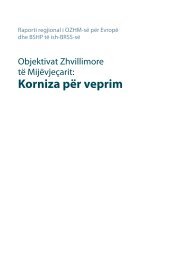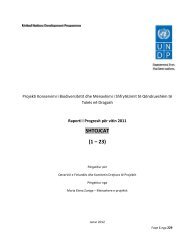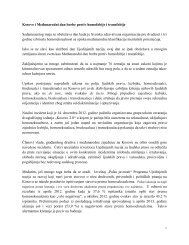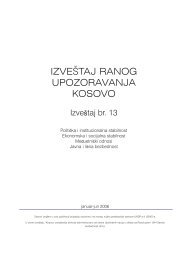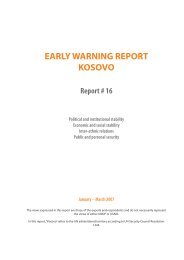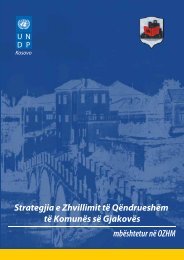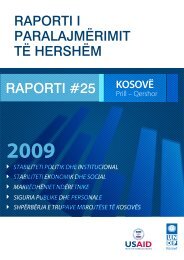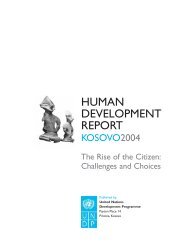Kosovo Human Development Report 2010 - UNDP Kosovo - United ...
Kosovo Human Development Report 2010 - UNDP Kosovo - United ...
Kosovo Human Development Report 2010 - UNDP Kosovo - United ...
Create successful ePaper yourself
Turn your PDF publications into a flip-book with our unique Google optimized e-Paper software.
entated basis for examination of social<br />
inequities. It extends beyond the issues<br />
of employment or income and addresses<br />
other factors and reasons why<br />
people are excluded socially. <strong>Kosovo</strong><br />
has complex multi-dimensional mechanisms<br />
and cycles that exclude individuals<br />
and groups from taking part in<br />
the critical process of socio-economic<br />
and political exchange. Moreover, the<br />
approach shifts the focus from “vulnerability”<br />
as an individual or group<br />
characteristic to societal barriers preventing<br />
full participation, thus leaving<br />
excluded people at the margins.<br />
For example, a young woman or<br />
man without sufficient education and<br />
skills may easily end up in a cycle of<br />
poverty and dependency on social assistance.<br />
Since most unemployment<br />
in <strong>Kosovo</strong> is long-term, they are easily<br />
convinced that finding a job will be<br />
impossible. Their children may then accept<br />
the idea that being unemployed<br />
is socially acceptable. Without recourse<br />
to opportunity, feelings of inadequacy<br />
and lack of social influence come to<br />
dominate the family’s interaction with<br />
the community. Marginalization swiftly<br />
follows. Social contacts are reduced<br />
with all except immediate family or<br />
other long-term unemployed. Lifting<br />
families out of this cycle, once it is well<br />
established, becomes extremely challenging.<br />
It is even harder to address exclusion<br />
when it comes packaged as social<br />
rejection. This is the unfortunate reality<br />
for many of <strong>Kosovo</strong>’s ethnic minorities<br />
– in particular <strong>Kosovo</strong>-RAE communities.<br />
Their lack of integration into <strong>Kosovo</strong>’s<br />
society manifests itself as higher<br />
than average unemployment, much<br />
lower levels of education and extremely<br />
low housing standards compared to<br />
the rest of the population. This in turn<br />
20 | KOSOVO HUMAN DEVELOPMENT REPORT <strong>2010</strong><br />
prevents them from seeking greater<br />
integration, and reinforces the strong<br />
internal bonds that keep them separate<br />
from their mainly <strong>Kosovo</strong>-Albanian<br />
neighbours. Fear of the unknown<br />
and unwillingness to accommodate<br />
differences also underlies exclusion of<br />
other minority groups (not necessarily<br />
ethnic minorities), such as people<br />
with disabilities or young people from<br />
poorer backgrounds. They may be dissuaded<br />
from continuing beyond compulsory<br />
education by inaccessibility of<br />
university buildings, high charges and<br />
an absence of institutional and family<br />
support.<br />
Not only minorities are excluded in<br />
<strong>Kosovo</strong>. Women – nearly 50 percent of<br />
the population – are denied their full<br />
right to contribute socio-economically<br />
and politically – for a range of cultural<br />
reasons which this KHDR seeks to examine.<br />
Young people, particularly the<br />
poor, have also demonstrated an increased<br />
disaffection with a political<br />
process they feel does not represent<br />
them – threatening to de-link <strong>Kosovo</strong>’s<br />
democracy with the generation it was<br />
developed to serve.<br />
Governments are responsible and<br />
accountable for setting adequate legislative,<br />
administrative and budgetary<br />
measures to put in place a system<br />
which prevents social exclusion. <strong>Kosovo</strong>’s<br />
authorities have taken some important<br />
steps in this direction. The constitution<br />
incorporates The Convention<br />
on the Elimination of All Forms of Discrimination<br />
against Women (CEDAW);<br />
addresses the rights of minorities by<br />
incorporating the Framework Convention<br />
on the Protection of National Minorities<br />
of the Council of Europe and<br />
includes the Convention on the Rights<br />
of the Child. 11 The <strong>Kosovo</strong> Action Plan<br />
for People with Disabilities 2009-2011<br />
was developed and adopted through



